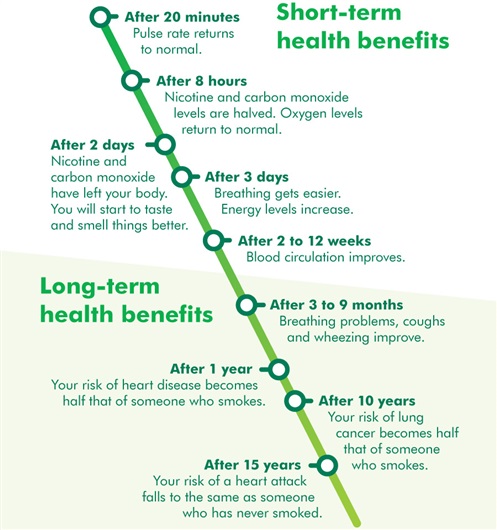Health Benefits of Quitting Smoking Over Time - American Can Be Fun For Anyone
A Biased View of The Quit Smoking Timeline – What Happens When You Quit?
Smoking cigarettes damages the nerve endings accountable for the senses of smell and taste. In just 2 days after quitting, a person may discover an increased sense of odor and more vibrant tastes as these nerves recover. 3 days after quitting cigarette smoking, the nicotine levels in an individual's body are depleted.

/ways-relieve-insomnia-when-quit-smoking-2824683_final-2871a4a0c27b43d7a2350a4c62bb7d56.gif)
Around 3 days after stopping, the majority of people will experience moodiness and irritation, severe headaches, and cravings as the body readjusts. In just tabex quit smoking , an individual's lung function begins to improve. As the lungs heal and lung capacity enhances, previous cigarette smokers might discover less coughing and shortness of breath.

For the next numerous months after quitting, circulation continues to enhance. Nine months after stopping, the lungs have actually significantly recovered themselves. The delicate, hair-like structures inside the lungs known as cilia have actually recovered from the toll cigarette smoke took on them. These structures help press mucus out of the lungs and assist combat infections.
One year after stopping smoking, an individual's danger for coronary cardiovascular disease reduces by half. This risk will continue to drop past the 1-year mark. Cigarettes include lots of known toxins that trigger the arteries and capillary to narrow. These exact same toxic substances also increase the likelihood of establishing blood clots.
More About A Timeline for Easing Yourself Off Cigarettes - Nicorette

This widening indicates the blood is less likely to embolisms, reducing the risk of stroke. The risk of stroke will continue to minimize over the next 10 years as the body heals more and more. After 10 years, a person's chances of establishing lung cancer and passing away from it are roughly cut in half compared to somebody who continues to smoke.
After 15 years of having actually given up smoking, the probability of establishing coronary heart illness is the equivalent of a non-smoker. Likewise, the threat of establishing pancreatic cancer has reduced to the very same level as a non-smoker. After twenty years, the threat of death from smoking-related causes, including both lung illness and cancer, drops to the level of an individual who has never ever smoked in their life.
UNDER MAINTENANCE